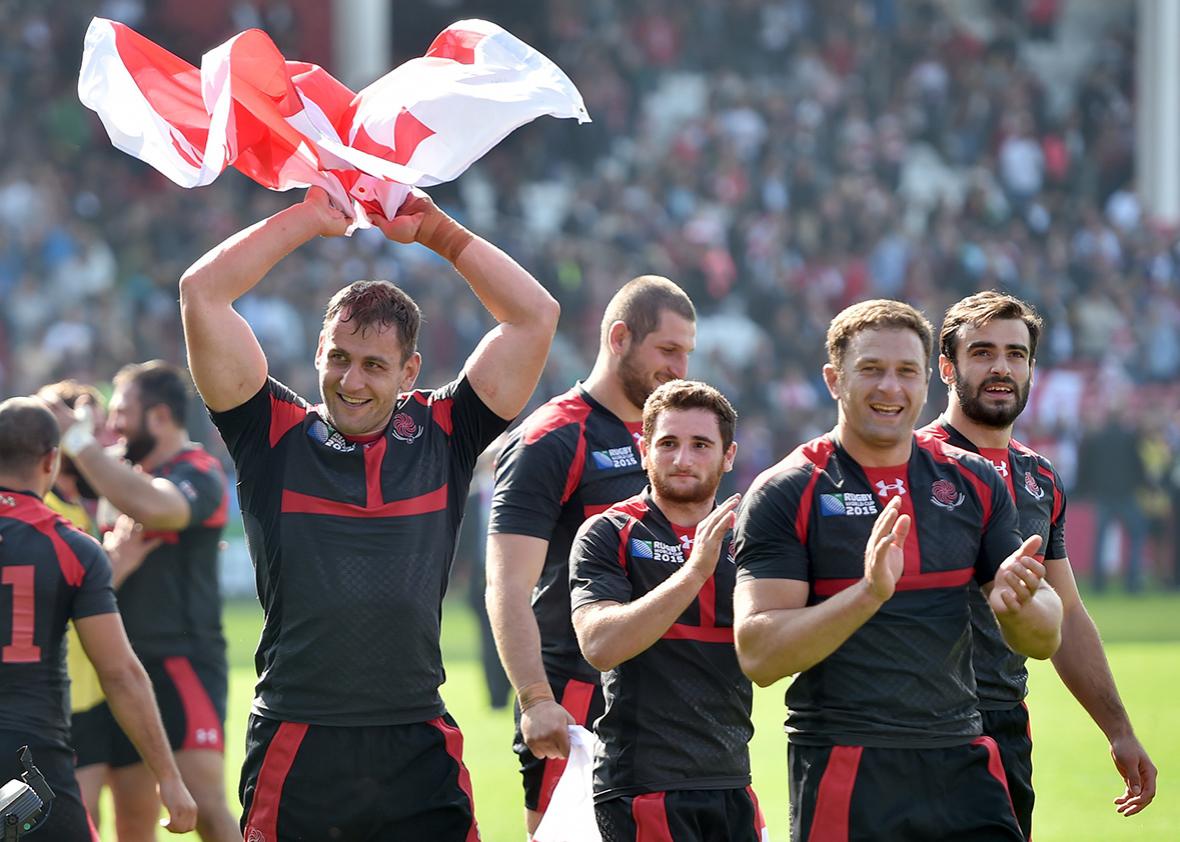In just the second match of the 2015 Rugby World Cup, which opened last week in England, the small Caucasus nation of Georgia gave the tournament its first upset with a 17–10 win over an experienced Tongan side. In a sport where the past matters, Georgia is a relative newcomer, and beating a team with nearly a century of test play—and a strong World Cup upset history of its own—was a big win. But Georgia, which initially struggled to even get matches after gaining its independence from the Soviet Union in 1991, has steadily become a surprise threat in the world of rugby and now has a chance to do more damage against fellow rugby trailblazer Argentina on Friday. Rugby is now the most popular sport in the nation of less than 4 million. What’s more, Georgia’s rise has been made in the shadow of its darkest hour: the nation’s 2008 war with Russia. That war has fueled an intense rugby rivalry with the Russians, but it has also helped inspire the team to new heights—since 2008, Georgia has won the second-tier European Nations Cup six out of seven times and maintained its best run in the world rankings.
Merab Sharikadze, Georgian rugby’s top player in 2014, knows how important the sport is to his countrymen. “Georgia had some hard times as a country, and the people had hard times. They’re finding their relaxation and their strength and their happiness on the rugby pitch,” Sharikadze told me. The gregarious inside center draws motivation from the fervent, singing supporters who pack Georgia’s stadiums to support the Lelos. (The team nickname is the name of an old folk football game similar to rugby that has been played in Georgia from the pre-Christian period.) “You can make them forget about everything else. They have other troubles,” he said. “[But you can] make them happy by winning or playing well.”
Georgia’s troubles began when Russia invaded in August 2008, Sharikadze says. “Putin still has troops in South Ossetia,” he said. “They have occupied our territory. … That kind of stuff destroys your economy.”
Like most of Georgia’s best performers, the 22-year-old, 36-match veteran—noted for his ferocious tackling—makes his living playing for a club team in France, but he often thinks of home. “In 2008 no one could imagine that something would happen because everything was going so well,” he said. “You never know what this guy [Putin will] do.” (In the years since Russia’s occupation of the South Ossetia region and nearly 20 percent of Georgian territory, Putin has invaded Ukraine and hugged a bear.)
The ongoing stress of the occupation has charged Georgia’s test matches against Russia. Since the war, Georgia has won seven of seven matches against Russia, their last match being a 33–0 home victory in Tbilisi in March. (Historically, the Lelos have won 17 out of 19 against Russia, losing the first contest between the two sides in 1993 but dominating since then.) “People won’t forgive us if we lose that game,” Sharikadze said. “The Russia game is always with the biggest crowd and the biggest noise on the pitch, so it gives us extra power all the time.”
A few of the current Lelos were even in the Georgian army during Russia’s 2008 invasion, but they are reluctant to talk about it and didn’t want their names mentioned, according to the team’s media manager.
The team was on the rise right before the war and has only rallied since. The Lelos have won 25 of their last 26 tests in the European Nations Cup (the second tier after Europe’s premiere Six Nations competition). They had a respectable showing in the 2011 Rugby World Cup in New Zealand. This year, their under-18 team beat Ireland and came in second to France in the European final. “Everyone is working hard,” Sharikadze says. “We want the whole world to know Georgia.”
The war and its aftermath have not been the nation’s only difficulties in recent years, though. Flash floods wrecked the Tbilisi Zoo in June, and Georgia’s weather is another regular challenge for the Lelos in both practices and matches. “Against Belgium last year in Georgia, the pitch was frozen, and we were freezing,” Sharikadze recalls. “Every single tackle you could feel that the pitch was hard as ever. I should not feel any coldness, but I was freezing.”
Coach Milton Haig’s first game, in Ukraine in 2012, got called off because it was negative 40 degrees. But the Lelos play when it’s snowing or as low as negative 21, Haig says.
Russia and Georgia’s 2009 and 2010 games had to be held on neutral territory—in Ukraine and Turkey—because of the war. “Many Georgians still feel very, very angry about it,” Haig says. “From a Georgian perspective, Russia still occupies Georgian territory, no more than 50 kilometers from where we live.”
That recent history hangs over the games, said Haig, a Maori New Zealander who had never experienced anything like the rivalry before. “The first year was crazy,” he said. “As a foreigner you’ve got no understanding of it really, and what it does to a whole country, that this game’s coming up.” That 2012 game, the first match against Russia in Georgia since the war, the Lelos kept calm and won 46–0.
Haig is one of seven Kiwis coaching teams at the World Cup, which bills itself as the world’s third biggest international sporting event. He learned Georgian to give his players thorough team talks before their World Cup games.
Georgia’s third match of the World Cup will come against New Zealand’s legendary All Blacks, the current title-holders. Haig and Sharikadze aren’t daunted by the thought of Georgia tussling with All Blacks legends like Ma’a Nonu, Conrad Smith, and Richie McCaw in Cardiff, Wales. “We’re not afraid of any team,” Haig says.
